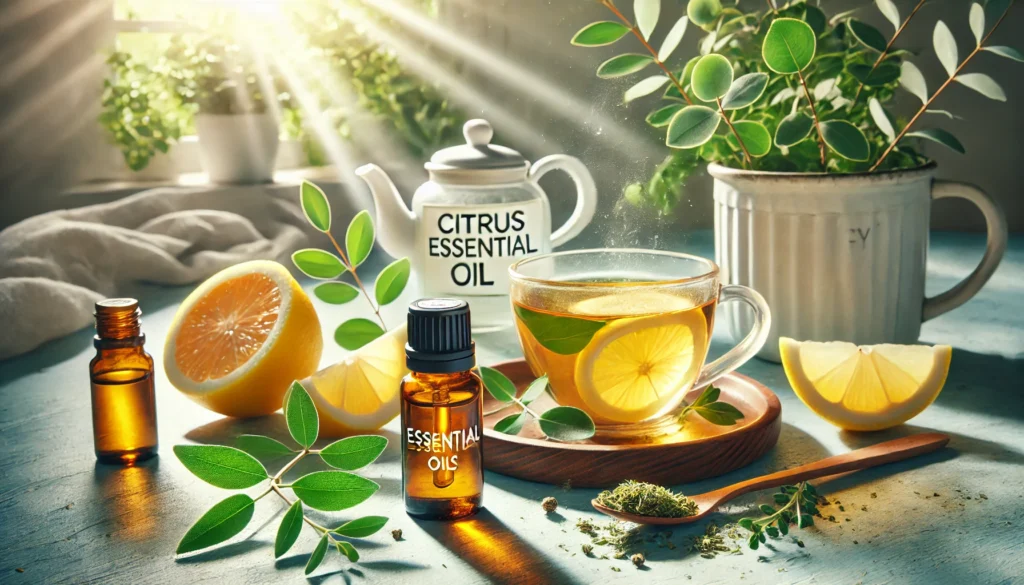Introduction: Harnessing Nature’s Power for Emotional Well-Being
In today’s fast-paced world, maintaining emotional well-being and sustained energy levels can be challenging. Stress, fatigue, and daily pressures can weigh heavily on the mind, leading to a decrease in overall happiness and vitality. Fortunately, nature provides a powerful solution: uplifting essential oils. These concentrated plant extracts have been used for centuries in aromatherapy to promote emotional balance, enhance mood, and revitalize the mind. The practice of using essential oils for uplifting mood and overall well-being is supported by both historical traditions and modern scientific research, making it a valuable tool for anyone seeking natural mood enhancement.
You may also like: Best Herbs for Anxiety and Depression: Natural Remedies That Truly Work
Aromatherapy for mood enhancement is not just a holistic approach; it is an evidence-backed method of leveraging the chemical properties of natural plant compounds to stimulate the brain’s emotional and cognitive centers. Essential oils for happiness and energy work by engaging the olfactory system, which directly connects to areas of the brain responsible for emotion and memory. This interaction results in immediate and lasting effects on mood, motivation, and overall mental clarity. Whether through diffusion, topical application, or inhalation, mood-boosting essential oils can transform emotional well-being, providing relief from stress and fatigue while enhancing energy and happiness.
This article explores the science behind uplifting aromatherapy oils, highlighting the best essential oils for mood enhancement and their benefits. Additionally, practical guidance on how to use these oils effectively will be provided to help integrate them into daily life seamlessly. By understanding the mechanisms through which essential oils improve mood and energy, individuals can harness their natural properties to achieve emotional balance, heightened focus, and a greater sense of well-being.
The Science of Aromatherapy: How Essential Oils Influence Mood and Energy
Aromatherapy is based on the principle that scent can have a profound impact on psychological and physiological states. When inhaled, essential oil molecules stimulate the olfactory receptors in the nose, which send signals directly to the limbic system—the part of the brain that governs emotions, memories, and behavior. This connection explains why certain scents trigger specific emotional responses and why uplifting essential oils are particularly effective at enhancing mood and boosting energy levels.
Scientific studies have demonstrated that certain essential oils for mood enhancement possess properties that influence neurotransmitter activity in the brain. For example, citrus-based oils like lemon and sweet orange contain high levels of limonene, a compound known for its stimulating effects on the nervous system. Limonene has been found to increase serotonin and dopamine levels, neurotransmitters responsible for feelings of happiness and pleasure. Similarly, essential oils like peppermint and rosemary enhance cognitive function by increasing alertness and reducing mental fatigue, making them ideal for sustaining energy throughout the day.
Furthermore, mood-boosting essential oils often contain compounds with anxiolytic (anxiety-reducing) and antidepressant properties. Lavender, for instance, is well-known for its calming effects, helping to alleviate stress and promote relaxation without causing drowsiness. This balance between relaxation and invigoration makes essential oils a unique and versatile tool for maintaining emotional stability. The ability of aromatherapy to regulate mood and energy levels naturally provides an effective alternative to synthetic stimulants or pharmaceutical interventions, making it a safe and holistic approach to emotional wellness.
Best Essential Oils for Happiness and Energy
Citrus Essential Oils: Nature’s Uplifting Elixirs
Citrus essential oils are among the most effective uplifting aromatherapy oils due to their bright, refreshing scent and energizing properties. These oils are extracted from the peels of citrus fruits and contain high concentrations of limonene and other terpenes known for their mood-enhancing effects.
- Lemon Essential Oil: Known for its invigorating and refreshing aroma, lemon essential oil is a powerful mood booster. Studies have shown that inhaling lemon oil can reduce anxiety, increase energy, and enhance cognitive performance. Diffusing lemon essential oil in the morning can create a positive atmosphere and increase motivation throughout the day.
- Sweet Orange Essential Oil: Sweet orange essential oil is widely used in aromatherapy for its cheerful and uplifting scent. It has been found to promote relaxation while simultaneously providing a sense of joy and energy. The sweet and tangy aroma stimulates serotonin production, which contributes to feelings of well-being and positivity.
- Grapefruit Essential Oil: Grapefruit oil is another citrus powerhouse that stimulates the senses and combats mental fatigue. Its bright, crisp scent is known to improve concentration and enhance mood, making it an excellent choice for combating stress and lethargy.

Floral Essential Oils: Balancing Mood and Encouraging Positivity
Floral essential oils are known for their ability to promote relaxation and balance emotional states. While many floral oils are calming, they also have uplifting properties that help to create a sense of contentment and inner peace.
- Lavender Essential Oil: Often associated with relaxation and sleep, lavender oil is also an effective mood stabilizer. It has been shown to reduce symptoms of anxiety and depression while enhancing overall emotional well-being. Diffusing lavender essential oil in workspaces or homes can create a tranquil yet uplifting environment.
- Ylang Ylang Essential Oil: Ylang ylang oil has a sweet, floral fragrance that helps to reduce stress and promote joy. It is known for its aphrodisiac properties and ability to balance emotions, making it an excellent choice for mood enhancement.
- Jasmine Essential Oil: Jasmine oil has a rich, exotic aroma that is linked to feelings of happiness and confidence. Research indicates that inhaling jasmine oil increases alertness and energy levels while reducing symptoms of stress and fatigue.
Herbal and Mint Essential Oils: Stimulating the Mind and Increasing Focus
Herbal and mint essential oils are highly effective at enhancing mental clarity and sustaining energy levels. Their invigorating scents make them ideal for combating fatigue and improving focus.
- Peppermint Essential Oil: A natural stimulant, peppermint oil is known for its ability to increase alertness and cognitive function. It has been found to improve concentration and provide a cooling, refreshing sensation that enhances both mental and physical energy.
- Rosemary Essential Oil: Often used in cognitive enhancement, rosemary oil boosts memory and focus. Research suggests that inhaling rosemary oil can improve brain function, making it an excellent choice for studying or tasks that require sustained attention.
- Eucalyptus Essential Oil: Eucalyptus oil has a clean, fresh scent that promotes mental clarity and respiratory function. It is commonly used in aromatherapy to clear the mind and improve energy levels.
Practical Applications: How to Use Essential Oils for Mood Enhancement
Incorporating essential oils into daily life is simple and can be tailored to individual preferences. The most common methods include diffusion, topical application, and direct inhalation. Diffusers disperse essential oils into the air, creating a mood-enhancing atmosphere. For a quick boost, adding a few drops of essential oil to a tissue or cotton ball and inhaling deeply can provide immediate effects.
Topical application, such as massaging diluted essential oils onto pulse points, allows for prolonged absorption and sustained benefits. Blending essential oils for customized aromatherapy experiences enhances their synergistic effects. For example, combining citrus oils with peppermint or rosemary creates an invigorating and uplifting blend that supports both mood and cognitive function.

Frequently Asked Questions (FAQ) on Essential Oils for Mood and Energy
What makes uplifting essential oils effective for mood enhancement?
Uplifting essential oils work by interacting with the olfactory system, which is directly linked to the brain’s limbic system—the area responsible for emotions, memory, and behavior. When inhaled, the volatile compounds in these oils stimulate neurotransmitters like serotonin and dopamine, which are associated with feelings of happiness and relaxation. Some essential oils for mood, particularly citrus-based varieties, also contain limonene, a compound known for its stimulating and antidepressant effects. Additionally, the simple act of engaging in aromatherapy for mood enhancement can promote mindfulness and reduce stress, further amplifying the benefits. By incorporating uplifting aromatherapy oils into daily routines, individuals can create a positive and energizing environment that naturally supports mental and emotional well-being.
How do different essential oils impact energy levels throughout the day?
Mood-boosting essential oils influence energy levels in distinct ways, depending on their chemical composition. Some oils, such as peppermint and eucalyptus, contain high levels of menthol and cineole, which invigorate the senses and improve cognitive function. These essential oils for happiness and energy are particularly beneficial in the morning or during mid-day slumps, helping to maintain focus and alertness. Conversely, floral oils like ylang-ylang and chamomile promote relaxation, which can be useful in managing stress-induced fatigue. Using a combination of these oils throughout the day allows individuals to sustain balanced energy levels while also preventing burnout and mental exhaustion.
Can essential oils for uplifting mood be used as a natural alternative to caffeine?
For individuals seeking an alternative to caffeine, certain essential oils to improve mood and energy can serve as an effective substitute. Oils such as rosemary, peppermint, and grapefruit have been shown to enhance alertness, improve circulation, and stimulate the nervous system in a way similar to caffeine. Unlike caffeine, which can lead to energy crashes and dependency, uplifting aromatherapy oils provide a sustainable source of stimulation without adverse effects. Additionally, combining stimulating essential oils with proper breathing techniques and hydration can further optimize their energizing properties. While essential oils may not fully replace caffeine for everyone, they offer a natural and holistic option for maintaining focus and motivation.
What are the best ways to incorporate essential oils into a daily routine?
Incorporating essential oils for mood into daily life can be done through various methods, depending on personal preferences and lifestyle. Diffusing mood-boosting essential oils in the morning can help set a positive tone for the day, while applying diluted oils topically to pulse points can provide a continuous effect. For those with demanding schedules, carrying a small roller bottle of essential oil blends allows for quick application during moments of stress or fatigue. Additionally, adding a few drops of uplifting essential oils to a warm bath or shower can enhance relaxation and mental clarity. Experimenting with different methods ensures a seamless integration of aromatherapy into daily habits, maximizing its therapeutic potential.
Are there any safety concerns when using essential oils for mood enhancement?
While essential oils for uplifting mood are generally safe, proper usage is crucial to avoid adverse reactions. Essential oils should always be diluted with a carrier oil before topical application to prevent skin irritation. Some oils, particularly citrus-based ones like lemon and bergamot, are phototoxic and can cause skin sensitivity when exposed to sunlight. Additionally, individuals with respiratory conditions should start with small amounts when diffusing oils to ensure they do not trigger sensitivities. Consulting with a qualified aromatherapist or healthcare provider is recommended, especially for pregnant individuals or those with underlying health conditions. Ensuring safe usage enhances the benefits of uplifting aromatherapy oils while minimizing any potential risks.
How do essential oils compare to synthetic fragrances for mood enhancement?
Unlike synthetic fragrances, which often contain artificial chemicals, essential oils for happiness and energy provide therapeutic benefits derived from natural plant compounds. Many commercial air fresheners and perfumes contain synthetic ingredients that can trigger allergies or disrupt hormonal balance. In contrast, mood-boosting essential oils work at a biochemical level to support emotional well-being, making them a safer and more effective alternative. Additionally, essential oils offer versatility—whether used in diffusers, personal care products, or household cleaning solutions. Choosing essential oils over synthetic alternatives not only enhances mood naturally but also supports overall health and well-being.
Can essential oils be blended for a more powerful effect?
Blending essential oils to improve mood can create synergistic effects that enhance their benefits. For example, combining citrus oils like orange and lemon with peppermint can result in an energizing and refreshing blend ideal for morning use. Alternatively, floral oils such as lavender and jasmine can be paired with grounding oils like sandalwood to promote emotional balance. Customizing blends allows individuals to tailor aromatherapy for mood enhancement based on personal preferences and specific needs. Understanding the properties of different essential oils helps in crafting combinations that work harmoniously to support both emotional and physical well-being.
What role do essential oils play in stress management and relaxation?
Essential oils for uplifting mood are not only useful for boosting energy but also play a significant role in stress management. Oils such as bergamot, chamomile, and frankincense help lower cortisol levels, the hormone associated with stress. By incorporating these oils into relaxation routines, such as through massage or meditation, individuals can foster a sense of calm and emotional stability. Additionally, using aromatherapy for mood enhancement during high-stress situations can provide immediate relief and improve resilience over time. The ability of essential oils to regulate emotional states makes them an invaluable tool for maintaining long-term mental wellness.
Do essential oils provide long-term benefits for mood and cognitive function?
While essential oils for mood provide immediate effects, consistent use can also offer long-term benefits for cognitive function and emotional health. Regular exposure to certain oils, such as rosemary and peppermint, has been linked to improved memory retention and mental clarity. Additionally, using essential oils to improve mood over time can help regulate emotional patterns, reducing the frequency of stress and anxiety episodes. Studies suggest that prolonged engagement with aromatherapy can rewire neural pathways, enhancing overall brain function and emotional resilience. By making mood-boosting essential oils a consistent part of daily self-care, individuals can experience sustained improvements in well-being.
How does the quality of essential oils impact their effectiveness?
The effectiveness of uplifting essential oils largely depends on their purity and sourcing. Many commercial essential oils contain synthetic additives or are diluted with carrier oils, reducing their potency. To experience the full benefits of essential oils for happiness and energy, it is essential to choose high-quality, therapeutic-grade oils. Reputable suppliers provide third-party testing results, ensuring that the oils are free from contaminants and retain their natural chemical integrity. Additionally, proper storage in dark glass bottles away from heat and light helps preserve the oils’ efficacy over time. Investing in high-quality essential oils guarantees optimal results and a truly transformative aromatherapy experience.

Conclusion: Elevating Mood and Energy with Essential Oils
Essential oils for uplifting mood and energy provide a natural, effective way to enhance emotional well-being and cognitive function. From citrus and floral scents to invigorating herbal and mint varieties, these plant-based remedies offer a holistic approach to maintaining happiness and vitality. By understanding their properties and incorporating them into daily routines, individuals can harness the power of aromatherapy to cultivate a more balanced, energized, and joyful life.
natural mood enhancers, stress relief essential oils, energizing plant extracts, holistic mood boosters, aromatherapy benefits for stress, uplifting scents for well-being, essential oils for positivity, emotional wellness with essential oils, relaxation and energy balance, therapeutic grade essential oils, botanical extracts for mental clarity, essential oils for daily wellness, plant-based mood support, cognitive enhancement with essential oils, natural remedies for fatigue, mind-body healing with aromatherapy, essential oils for stress resilience, citrus oils for mental focus, herbal solutions for energy boost, fragrance therapy for emotional health
Further Reading:
Essential oils used in aromatherapy: A systemic review
11 Essential Oils: Their Benefits and How To Use Them
Disclaimer
The information contained in this article is provided for general informational purposes only and is not intended to serve as medical, legal, or professional advice. While Health11News strives to present accurate, up-to-date, and reliable content, no warranty or guarantee, expressed or implied, is made regarding the completeness, accuracy, or adequacy of the information provided. Readers are strongly advised to seek the guidance of a qualified healthcare provider or other relevant professionals before acting on any information contained in this article. Health11News, its authors, editors, and contributors expressly disclaim any liability for any damages, losses, or consequences arising directly or indirectly from the use, interpretation, or reliance on any information presented herein. The views and opinions expressed in this article are those of the author(s) and do not necessarily reflect the official policies or positions of Health11News.


